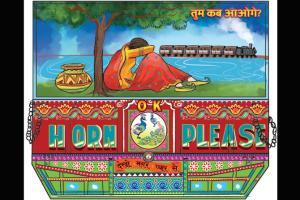All this struck me after I watched Ekta Mittal's haunting Gumnaam Din (Missing Days), that was in the Berlinale Shorts at the Berlin Film Festival earlier this year

Illustration/Uday Mohite
 Indians are big on pining. We are a nation of migrants, and Indians somehow make a virtue, even a fetish, of this feeling of missing the beloved. It can be yearning for a lover, a husband, a son—or God. We express it in myriad ways, we cherish it, we wallow in it, we let go. It has seeped into Indian culture—our philosophy, literature, poetry, painting, dance, music, film. From high art like the ragamala miniatures of the Ashta Nayikas, to sufi and baul songs, to Tum kab aaoge? (When will you return?) painted on the back of every other truck, with the desolate woman in a salwar-kameez, burying her head on her drawn-up knees, pining away for her beloved. (Somebody once observed that in traditional Indian painting, "the woman is rarely the lover, but always the beloved."). We have birha songs of separation. We have bidaai songs when the daughter gets married and goes away. Rudaalis and Tamil oppari singers sing wailing songs for us when someone passes away. We have raunchy-as-hell Bhojpuri bidesia songs, describing how the beloved can't wait to grab us again. And, India must be the only nation where you can still buy, on the streets, those delightful, kitschy song booklets like Mohammed Rafi ke dard bhare nagmein.
Indians are big on pining. We are a nation of migrants, and Indians somehow make a virtue, even a fetish, of this feeling of missing the beloved. It can be yearning for a lover, a husband, a son—or God. We express it in myriad ways, we cherish it, we wallow in it, we let go. It has seeped into Indian culture—our philosophy, literature, poetry, painting, dance, music, film. From high art like the ragamala miniatures of the Ashta Nayikas, to sufi and baul songs, to Tum kab aaoge? (When will you return?) painted on the back of every other truck, with the desolate woman in a salwar-kameez, burying her head on her drawn-up knees, pining away for her beloved. (Somebody once observed that in traditional Indian painting, "the woman is rarely the lover, but always the beloved."). We have birha songs of separation. We have bidaai songs when the daughter gets married and goes away. Rudaalis and Tamil oppari singers sing wailing songs for us when someone passes away. We have raunchy-as-hell Bhojpuri bidesia songs, describing how the beloved can't wait to grab us again. And, India must be the only nation where you can still buy, on the streets, those delightful, kitschy song booklets like Mohammed Rafi ke dard bhare nagmein.
ADVERTISEMENT
All this struck me after I watched Ekta Mittal's haunting Gumnaam Din (Missing Days), that was in the Berlinale Shorts at the Berlin Film Festival earlier this year. This 28-minute experimental film explores the birha, the double-edged longing, lamentation and grief of those who have migrated to distant lands, looking for work, as well as of those left behind. The filmmaker goes looking for someone who has vanished—he went looking for work far away, and simply disappeared. It is a film that is more experiential—it allows visuals and sounds, rather than dialogues, to evoke feelings. We see an elderly woman knead dough, a young woman dress up before a mirror and put on sindoor; trees swathed in mist, with the songs of cicadas, and at some point, women just burst into wails, unable to contain their grief. The film is also inspired by Shiv Kumar Batalvi's 'birha' poetry, of separation and ache.
The film also explores the ambiguities of separation. Some people may be glad to have escaped bitter circumstances back home. Do they want to be found? There's even a philosophical irony, a search for the self, as we hear a missing person read aloud his own missing person ad—if this person is found, please call such and such number. Bengaluru-based Mittal, co-founder of the Maraa collective, got to know some migrant labourers well, as they built the Bengaluru Metro. Drawing on their experiences, she made Behind the Tin Sheets, a series of short films observing their lives, then her debut feature documentary Birha (Absence, 80 min), followed by Gumnaam Din. Gumnaam Din, produced by the Public Service Broadcasting Trust, has been hauntingly shot by Paromita Dhar and Amith Surendran, with evocative sound design by Bigyna Dahal.
Meenakshi Shedde is India and South Asia Delegate to the Berlin International Film Festival, National Award-winning critic, curator to festivals worldwide and journalist. Reach her at meenakshi.shedde@mid-day.com
Catch up on all the latest Mumbai news, crime news, current affairs, and a complete guide from food to things to do and events across Mumbai. Also download the new mid-day Android and iOS apps to get latest updates.
Mid-Day is now on Telegram. Click here to join our channel (@middayinfomedialtd) and stay updated with the latest news
 Subscribe today by clicking the link and stay updated with the latest news!" Click here!
Subscribe today by clicking the link and stay updated with the latest news!" Click here!






